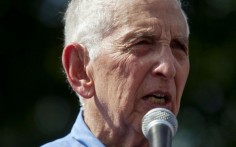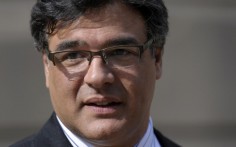
Human rights groups organise Hong Kong protest to support Edward Snowden

Local rights groups are planning a march to press home their call for the Hong Kong government to protect the personal safety of Edward Snowden, the former CIA man holed up in the city after blowing the whistle on US internet surveillance.
But the city's government remains tight-lipped on Snowden. He was not mentioned in a meeting between Chief Executive Leung Chun-ying and New York Mayor Michael Bloomberg on Monday, government sources said.
In-media, a website supporting freelance journalists, says it is planning a demonstration this week at the US consulate and outside government headquarters to support Snowdon.
Organiser Damon Wong Chun-pong said he was inviting more groups, including international human rights groups, to join. The Civil Human Rights Front, which is responsible for the annual July 1 pro-democracy march, has agreed to join.
"We are yet to agree on the theme of the march but basically we want to express concern about the personal safety of Snowden here," Wong said.
"If the US makes an extradition request, the Hong Kong government should not yield to pressure. It should confirm Snowden as a political asylum seeker and give him protection."
Tony Henderson, of the Humanist Association Hong Kong, urged the government not to try to second-guess what Beijing would expect, as it was likely to stay in the background.
Hong Kong has autonomy in extradition matters, but the the chief executive must comply with instructions from Beijing if failure to do so would "significantly" affect China's defence or foreign affairs interests. The city, unlike the mainland, has an extradition treaty with the US.
The Foreign Correspondents' Club said Snowden's case was a strong test of the government's commitment to freedom of expression and of the press. "The FCC will watch closely how the government handles his case, and in particular how it responds to any pressure from authorities both in Washington and Beijing to restrict his activities or to impede access by the media," it said.
But international rights groups remain cautious. Tawanda Hondora, deputy director of Amnesty International in London, said his organisation had no action plan to back Snowden as it knew little about his plans. "Our concern is the US government must come clean. It is unacceptable to spy on foreigners."
Simon Young, director of the University of Hong Kong's centre of public and comparative law, said the government should keep a low profile as long as the US made no extradition request. Besides applying for refugee status from the UN High Commissioner for Refugees and fighting extradition in court, Young said, Snowden could file an asylum claim to the city's government on the grounds of threat of torture.
THE WHISTLE-BLOWERS’ FATE
Americans accused of divulging secrets to the media have escaped long prison sentences, a pattern that may reassure Edward Snowden. Use of the Espionage Act to prosecute leaks to the press is murky because there are so few examples, said Elizabeth Goitein, a national security expert at New York University. The act carries a maximum sentence of 10 years in prison for each criminal count.
In the nine such criminal cases in US history, two people served no prison time, one person was sentenced to 10 months in a halfway house and three defendants received sentences of about two years.

Lawrence Franklin, a former US Defence Department employee who pleaded guilty in 2005 to giving classified information about Iran to pro-Israel lobbyists, was initially sentenced to more than 12 years in prison. But after the government's case fell apart, US District Judge T.S. Ellis imposed a new sentence of 10 months in a halfway house.

Three cases are unresolved, including that of US soldier Bradley Manning, the accused source of secret files given to anti-secrecy website WikiLeaks.
Reuters